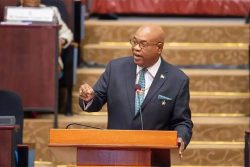BRASILIA, (Reuters) – Seen from Brazil’s modernist, glass-walled presidential palace, 2014 looks like a minefield.
The economy, already sputtering, will probably slow even further. A downgrade of Brazil’s credit rating seems possible, if not likely. The World Cup of soccer, which Brazil will host in June and July, could end up revealing to billions of TV viewers the shoddy government planning and transportation bottlenecks that have frustrated investors here for years.
To top it all off, leftist President Dilma Rousseff is up for re-election in October – meaning if any of those things go horribly awry, she might lose her job.
Rousseff is spending the final weeks of 2013 trying to restore her government’s tattered credibility with business leaders, keep budget spending under control, and otherwise ensure that next year does not turn out to be her worst – or final – year in office.
None of the measures amount to a fundamental change in policy. A dozen senior officials interviewed by Reuters over the past week described an administration that is concerned by Brazil’s deteriorating reputation in financial markets, but thinks the pessimism is overblown and is therefore unconvinced of the need for a major overhaul.
Instead, Rousseff is focused more on “putting the house in order,” in the words of one official, before the 2014 election campaign kicks off in earnest and the U.S. Federal Reserve begins reining in its monetary stimulus, a move that is likely to cause instability in emerging markets like Brazil.
In recent days, the president has: cut a deal that should prevent Congress from passing new spending bills; reversed a decision that would have allowed cities and states to spend more; and personally oversaw an auction of airports to the private sector, which she hopes will help prevent travel chaos during the World Cup. The touching-up has even extended to Rousseff herself: After visibly gaining weight during her nearly three years in office, the 65-year-old grandmother is now on a diet.
She has also begun using Twitter for the first time in her presidency. That’s part of a broader social media push aimed not just at the election, but at giving Rousseff a direct line to Brazilians should there be a repeat in 2014 of the massive anti-government street protests that rocked the country in June.
GETTING TO THE
CHURCH ON TIME
Many investors have scoffed at her recent moves, saying they amount to a superficial repackaging of a government that has meddled too much in the economy and destroyed much of the credibility that Brazil accumulated last decade, when it was one of the world’s fastest-growing emerging markets.
But officials pointed to her rising approval ratings, an unemployment rate that remains near record lows – and Rousseff’s hands-on approach – as signs that next year will not be as bad as some think.
“She’s making us work, it’s true,” said Sports Minister Aldo Rebelo, who is helping oversee preparations for the World Cup, including new stadiums and airport renovations. “The message is clear: 2014 is when we have to deliver results.”
Asked if he is worried about a logistical breakdown at the World Cup, which is expected to attract at least 300,000 visitors from around the globe, Rebelo compared it to trying to organize a wedding – which inevitably, he said, has some kind of hiccup.
“Every one I’ve ever been to, the bride always shows up late,” Rebelo said. “And yet the wedding goes ahead anyway, every time.” “I think we’re going to be fine,” he added.
That breezy confidence has been typical in Brasilia in recent years, alarming some investors who worry the government is still celebrating last decade’s conquests and not taking the current problems seriously enough.
Brazil’s economy grew a torrid 7.5 percent in 2010, the year Rousseff was elected, but has slowed sharply since she took office. Economists expect growth of 2.5 percent this year and 2.1 percent in 2014.








